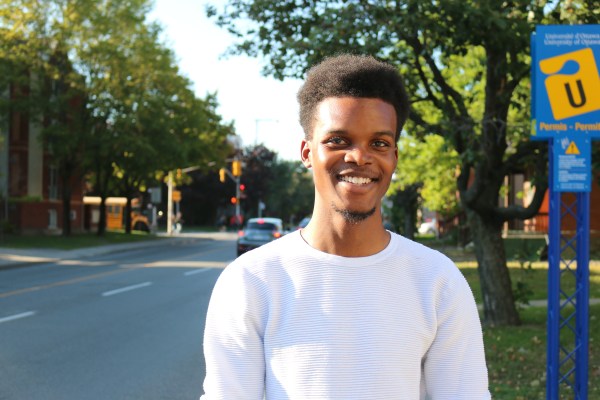2024 iteration of the climate march
A climate march organized by Fridays for Future Ottawa took place on the morning of September 21. The march aimed to confront six “climate culprits” the organization claims stand in the way of proper action toward climate change. The list contains the City of Ottawa, the Royal Bank of Canada (RBC), the Canadian Gas Association (CGA), the Province of Ontario, the Canadian Association of Petroleum Producers (CAPP), and Export Development Canada (EDC). Following a route around downtown Ottawa, protestors demonstrated outside the head office of each culprit.
Starting at city hall, protestors from a variety of causes came together, united in their passion for safeguarding the environment. Makaela Kennedy of Horizon Ottawa delivered a speech in tandem with a high school student in which theyaccused the City of Ottawa of being disingenuous with their concern for climate change and listed the city’s shortcomings from its own Climate Change Master Plan. The speakers also criticized the city’s recently approved real estate developments, contrasting them with the cuts to transit services.
Marching under the supervision of multiple police liaisons, demonstrators made their way to the RBC branch at 99 Bank St. Here, Alex Stratas from Climate Justice UO (CJCUO) delivered a speech highlighting RBC’s role in the proliferation of the fossil fuel industry.
Stratas cited the Banking on Climate Chaos report in stating RBC has invested $256 billion into fossil fuels projects since 2016. According to the CBC, RBC was the largest financier of fossil fuels globally in 2022. These investments are often at odds with Indigenous sovereignty, particularly projects like the Coastal GasLink pipeline, which runs directly through Wet’suwet’en territory. RBC is the exclusive financier of the Coastal GasLink pipeline’s construction, prompting protesters to label the bank “the Royal Bank of Colonialism.”
Speakers urged demonstrators to take their money out of Canadian banking institutions and look into local credit unions instead.
The next stop on the tour was the office of the Canadian Gas Association at 350 Albert Street. The CGA is a lobbying group comprised of Canadian gas distribution companies, transmission companies, equipment manufacturers, and other service providers. Their website claims they are “the voice of Canada’s natural gas delivery industry.”
Protestors were most concerned about CGA’s grassroots advocacy group, Voice for Energy, which campaigns in support of the natural gas industry. Fridays for Future states that under the recent anti-greenwashing legislation bill C-59, such organizations should be illegal for trying to disseminate propaganda about the benefits of natural gas.
Following that demonstration, protestors made their way to the office of the Province of Ontario. Speakers voiced their discontent with the Ford government’s opposition to the carbon tax and the federal government’s infrastructure fund. They also demanded Ontarians receive a free universal heat pump as a more sustainable alternative to heating their homes.
Right across the street from the Provincial government’s office was the march’s next stop, the Canadian Association of Petroleum Producers (CAPP). CAPP is another industry-funded research organization that aims to advocate for oil and gas companies. The Fridays for Future Ottawa website specifically critiques the association’s lobbying efforts to undermine emissions regulations and its failure to clean up or address the environmental damage it causes.
The protest’s final stop was at the head office of Export Development Canada (EDC). EDC is a crown corporation that provides loans, insurance, and subsidies for export-related companies, including the fossil fuel industry. This year alone, the EDC has approved a loan of up to $500 million to a natural gas project in British Columbia. Protestors routinely shouted “shame” after hearing these statements. A speaker from Environmental Defence handed out postcards addressed to Justin Trudeau, urging him to invest in a sustainable future through infrastructure and food programs.
The march concluded back at city hall, where music and dancing accompanied free food. Fridays for Future encourages people to educate themselves on the realities of environmental governance and hopes to see more people volunteer and march in the future.
A few days after the march the Fulcrum caught up with speaker and CJCUO president Alex Stratas to get her thoughts on how the event went.
“The Climate Strike March this year went exceptionally well. From purely an organizing perspective it was efficient, everyone understood their roles, and the numbers they were able to keep throughout the entirety of the March was impressive. The strategy of targeting ‘culprits’ in the climate crisis also gives people a destination for the movement. The sense of ‘these are the active agents in the climate crisis that perpetuate it, that fund it, and that seek to profit off of it,’ was further reinforced by the fact that at every stop they made, they had specific actions the crowd could participate in to mobilize. My largest criticism is that it was on a Saturday, instead of a Friday or another day of the week. I find that protests are a great tool for disruption and in terms of that it could have been more effective.”
“But the way it brought the community together I think shows great promise for future climate strike’s to come. It makes me excited to see the new incoming wave of organizers in the community already doing incredible work and how they now carry on the torch for the next generation to come.”



